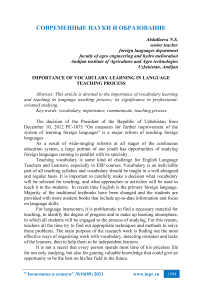Importance of vocabulary learning in language teaching process
Автор: Abdullaeva N.S.
Журнал: Экономика и социум @ekonomika-socium
Рубрика: Современные науки и образование
Статья в выпуске: 10 (89), 2021 года.
Бесплатный доступ
This article is devoted to the importance of vocabulary learning and teaching in language teaching process; its significance in professionaloriented studying.
Vocabulary, importance, communicate, teaching process.
Короткий адрес: https://sciup.org/140260978
IDR: 140260978
Текст научной статьи Importance of vocabulary learning in language teaching process
The decision of the President of the Republic of Uzbekistan from December 10, 2012 PC-1875 "On measures for further improvement of the system of learning foreign languages" is a major reform of teaching foreign languages.
As a result of wide-ranging reforms at all stages of the continuous education system, a large portion of our youth has opportunities of studying foreign languages running in parallel with its specialty.
Teaching vocabulary is some kind of challenge for English Language Teachers and Learners, especially in ESP courses. Vocabulary is an indivisible part of all teaching syllabus and vocabulary should be taught in a well-designed and regular basis. It is important to carefully make a decision what vocabulary will be selected for teaching, and what approaches or activities will be used to teach it to the students. In recent time English is the primary foreign language. Majority of the traditional textbooks have been changed and the students are provided with more modern books that include up-to-date information and focus on language skills.
For language instructors, it is problematic to find a necessary material for teaching, to identify the degree of progress and to make up learning atmosphere, in which all students will be engaged to the process of studying. For this reason, teachers all the time try to find out appropriate techniques and methods to solve these problems. The main purpose of the research work is finding out the most effective ways of organizing work with vocabulary, detecting mistakes and lacks of the learners, then to help them to be independent learners.
It is not a secret that every person spends most time of his priceless life for not only studying, but also for gaining valuable knowledge that could give an opportunity to be the best on his/her field in the future.
One of the main and very important part in learning English is vocabulary learning and teaching; but, for a number of years vocabulary was a neglected area in foreign language teaching. Language teachers should encourage students to learn as many words as possible in succession to develop their communicative competence. English for specific purposes course (ESP) is new trend in English Language Teaching. They include technical English, scientific English, English for medicine, Agricultural English, English for tourism and English for waiters. There are different judgments about teaching ESP courses but vocabulary is central in this sphere of teaching. The students should become aware of the significance of language learning strategies and get trained to use them correctly.
The importance of vocabulary learning in ESP is addressed by Paltridge
From my teaching experience I can say that students face difficulties while learning new English words. It is difficult to learn words, especially ESP words because they are low-frequency words and are not encountered very often.
In nature vocabulary learning is incremental and this means that words are not remembered immediately but they are learned over a period of time. The number of learned words depends on numerous exposures to an exacting word. No matter how well the student learns grammar, no matter how successfully the sounds of L2 are mastered, without words to express a wider range of meanings, communication in an L2 just cannot happen in any meaningful way.
Schmitt emphasizes that “the object of vocabulary learning is to transfer lexical information from short-term memory, where it resides during the process of manipulating language, to permanent long-term memory”.
Driscol gives a detailed explanation of each: episodic memory refers to specific events such as in specific events as remembering the circumstances of how one learns to read a map. Whereas semantic memory refers to all the general information stored in memory and recalled independently of how one has learned the information. The circumstances under which reading a map was learned are not memorable but the skill is remembered. The long-term and working memories are also important in producing speech where the material is accessed and assembled from the long-term memory.
Learning concrete words is easier than learning abstract words. Learners can more easily remember words like: peach, house , and horse if they appear on a list than words such as freedom and injustice . The reason is that the verbal system represents the meaning of the words, but the imaginal system represents images of the words. The concrete words are remembered better with two memories available at recall, as opposed to one for abstract words (Driscol, 2005).
ESP (English for Specific Purposes) courses are related to and designed around students’ needs based on their field of study. The purpose is to strengthen students’ proficiency and help them to get ready to cope with everyday situations and deal with professionals in many fields such as: economy, engineering, medicine, agriculture, education, IT, etc.
Список литературы Importance of vocabulary learning in language teaching process
- Nation, I.S.P. (2001). Learning vocabulary in another language. Cambridge: Cambridge University Press
- Paltridge, M. & Starfield, S. (2013). The Handbook of English for Specifi c Purposes. Published by John Wiley & Sons, Inc. p.225
- Woodward - Kron , R. ( 2008 ) More than just jargon – the nature and roles of specialist knowledge in learning disciplinary knowledge . Journal of English for Academic Purposes 7: p.246


